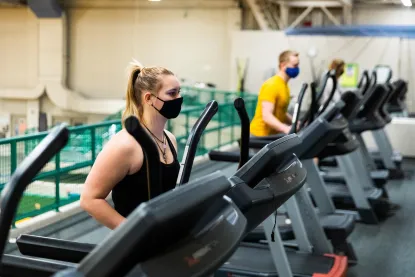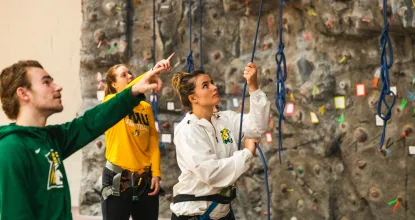Image

Northern Michigan University's School of Health and Human Performance offers a wide range of individual testing, personal training, and consultation related to fitness and health, as well as a group fitness program. Services are offered by appointment at the individual's convenience. We have a team of specialized professionals with the expertise to accommodate your schedule. Our School has two well-equipped exercise science laboratories; one located on the Northern Michigan University (NMU) campus in the Physical Educational Instructional Facility (PEIF), and the School of Health and Human Performance Research Lab (SHHPRL) located on Washington Street near the hospital. Our professionals are also available for workshops, presentations, and staff in-service on a wide range of health and fitness topics tailored to your group. Contact the School of Health and Human Performance at 227-2130 or email hhp@nmu.edu for additional information.
MoveUP FITNESS PROGRAM
The Move UP fitness program is a community outreach service provided by the School of Health and Human Performance that allows the Marquette and NMU communities the opportunity to engage in a variety of exercises at multiple intensities led by our graduate students. This program is conducted during the fall and winter semesters. Participants attend one-hour sessions three times per week, Mondays, Wednesdays and Thursdays during the semester at their designated times detailed below:
Winter 2024 Schedule:
January 22, 2024 – April 18, 2024
7:00 a.m.-7:55 a.m.
5:00 p.m.-6:00 p.m.
MoveUP Program Fee (per semester):
New Participant - $150.00 ($140 for NMU Faculty, Staff, Students and Spouses or PEIF Pass Members)
Returning Participant - $100.00
Instruction is aimed at encouraging individuals to develop healthy lifestyles, which include activities to enhance fitness and relieve stress. The MoveUP Program is conducted in the exercise science lab located in room 146 of the Physical Education Instructional Facility (PEIF). The exercise science lab is climate controlled and program enrollment is limited to provide individual attention, as well as access to equipment. Always talk to your doctor before starting an exercise program.
We will be adhering to University Covid-19 protocols. The workouts will be designed to maximize social distancing and the staff will be regularly disinfecting the equipment and facility before, during and after the sessions.
MoveUP Sessions Format
Participants may select from sessions that vary from vigorous to low intensity, three days a week for one hour per session. Each session will have a warm-up, an extended activity portion designed by our graduate students to address muscular endurance, aerobic fitness, and/or flexibility along with a cool-down. The specific types of exercise sessions will vary throughout the semester providing participants the fun of experiencing multiple types of fitness activities and allowing our graduate students with valuable experience of designing and instructing many different fitness programs. The fitness sessions may include circuits, boot camp, yoga, walking/running intervals, resistance training, bodyweight routines, and many others.
MoveUP Fitness Testing
In the beginning and ending weeks of the semester, participants will have the opportunity (optional, but included in the cost) to have fitness testing conducted that will include body composition (DEXA), resting heart rate, submaximal VO2 test, flexibility, muscular strength and muscular endurance.
MoveUP Program Staff
Graduate assistants and interns in Exercise Science and Applied Exercise Science and Health majors
Kyle Bolen, M.A., Instructor, Coordinator
Registration/Inquiries:
Email: hhp@nmu.edu
Tele: (906) 227-2130
HEALTH AND FITNESS SERVICES
FITNESS SERVICE DEFINITIONS
- Body Composition/Deposition Analysis: Provides a good estimation of body composition, expressed as percent body fat, to assist in setting goals for diet and exercise.
- Biomechanics assessments: Specific information available upon request.
- DEXA analysis: Dual Energy X-ray Absorptiometry (DEXA) often called a bone scan or bone assessment is the name of the method used to determine the density of bone mineral content with minimal x-ray exposure. This test is used for the assessment of bone mineral density and body composition in total or specific regions of the body. The scan usually takes no longer than 12 minutes to complete and would require the client to lay still on a bed-like mat with their clothes and shoes off while an arm of the machine scans over the top of their body. The assessment is packaged with an explanation of results, a flash drive with a digital copy of the results to keep and share with a healthcare provider, and individualized health maintenance suggestions (additional charges for exercise prescription with 1 year follow-up testing).
- Dynamometry strength testing: Strength testing evaluates the strength of muscles and the range of motion of the joints. Results can be used to assess differences between sides of opposing muscle groups to determine any potential muscle imbalances and potential for injury. This assessment includes an explanation of individual results and suggestions for improving or maintaining strength.
- Fitness assessment: Available for individuals interested in obtaining an accurate view of their current fitness status and professional assistance in developing or adjusting a personal exercise program based on that information.
- Fitness consultations: A qualified exercise specialist will assist in design or improvement of a fitness program. This is based on the individual’s interests and goals and will include motivation, exercise selection, form, technique and resources.
- Knee (ACL) injury screening: Specific information available upon request.
- Lactate threshold test: Lactate threshold is an indicator of fitness and lactate threshold training is a common method for improving endurance performance. During the test, blood is drawn at several intervals during an incremental exercise test using a bike or treadmill. This assessment is packaged with your results and individualized training suggestions.
- Nutrition consultation: Specific information available upon request.
- Sport psychology: Specific information available upon request.
- VO2 testing: Maximum oxygen uptake, or VO2 max, is considered the best indicator of cardiovascular fitness and aerobic endurance. VO2max can be assessed using a graded exercise test to exhaustion on a bike or treadmill. Since a maximal test may not be feasible for some people, scch as those with a cardiovascular condition, VO2max can be estimated using a submax test. An assessment will be made prior to the testing to determine if the client should complete a maximal or submaximal test. This assessment includes an explanation of individual results and information on how fitness can be maintained or improved.
- Walking and running gait analysis: A gait analysis can be used to provide immediate, accurate, and reliable data which can be used to aid in patient diagnosis, treatment, and progress tracking. The main elements assessed in the walking and running gait analysis tests include: walking/running speed, step time, single and double support time, step length, step width, lower limb joint motion, and force. Analysis is done using high definition cameras in which the client would complete several walking or running trials of short distances. These assessments include a summary and explanation of results and suggestions to improve performance and prevent injury.
- Workshops, Presentations and Staff In-service: Our diverse and knowledgeable staff of health and fitness professionals are qualified to present on a wide variety of topics related to health and fitness and can tailor to your group.
Costs
The School of Health and Human Performance offers the below listed services by appointment. A two-week appointment lead time is recommended. To request an appointment email hhp@nmu.edu or call (906) 227-2130.
-Body composition/deposition analysis - $10.00
-Biomechanics assessments - Cost varies
-Individual exercise consultation - $30.00
-DEXA analysis - $125.00
-Dynamometry strength testing - $150.00
-Fitness assessment - $100.00 (NMU Students $50.00)
-Individual exercise consultation - $30.00
-Knee (ACL) injury screening - $150.00
-Nutrition consultation - cost varies per package
-Sport psychology services - $75/hour (individual), $200/hour (team)
-VO2 testing (max/submax) - $125.00
-VO2 testing (max/submax) + lactate - $200.00
-Walking/Running gait analysis - $200.00
